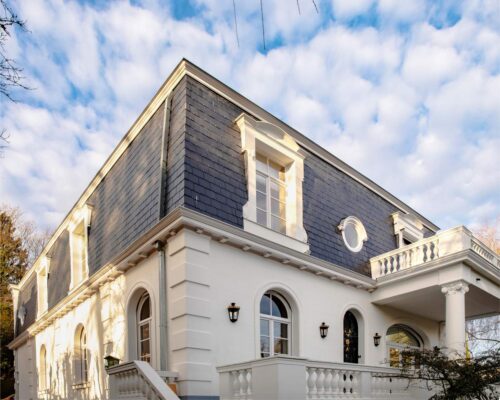Window Stories Continue To Be Written With The Flexible Warm Edge
Projects in Northern Ireland and Austria show how requirements of monument protection, expectations of style-conscious building owners and climate protection targets can be fulfilled.
In recent years, the restoration and reproduction of historic windows has increasingly been discussed in terms of thermal insulation. Selected projects in Northern Ireland and Austria show how the requirements of monument protection, the expectations of styleconscious building owners and climate protection targets can be fulfilled at the same time. Although completely different in terms of their realisation, energy-efficient insulating glass with the Super Spacer® warm edge spacer system was used in all three cases.
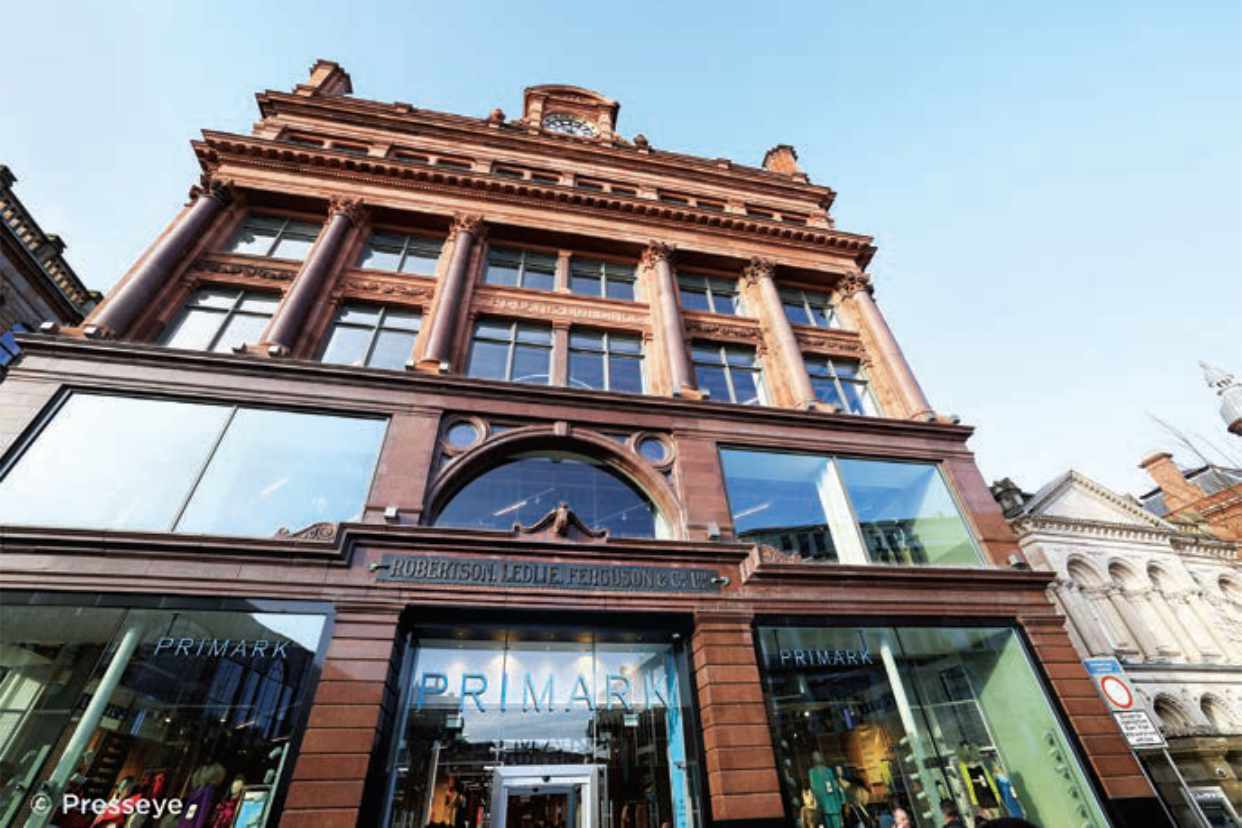
Reconstruction with authentic glazing
The Bank Buildings, a jewel of Victorian Belfast, are located in the centre of the Northern Irish capital.
The five-storey building ensemble has been owned by the Irish fashion chain Primark since 1979 and has been a listed building since 1980. Pillars of polished red granite flank the large windows on the main façade, while red sandstone characterises the upper floors of the building, which is topped by a huge iron clock face.
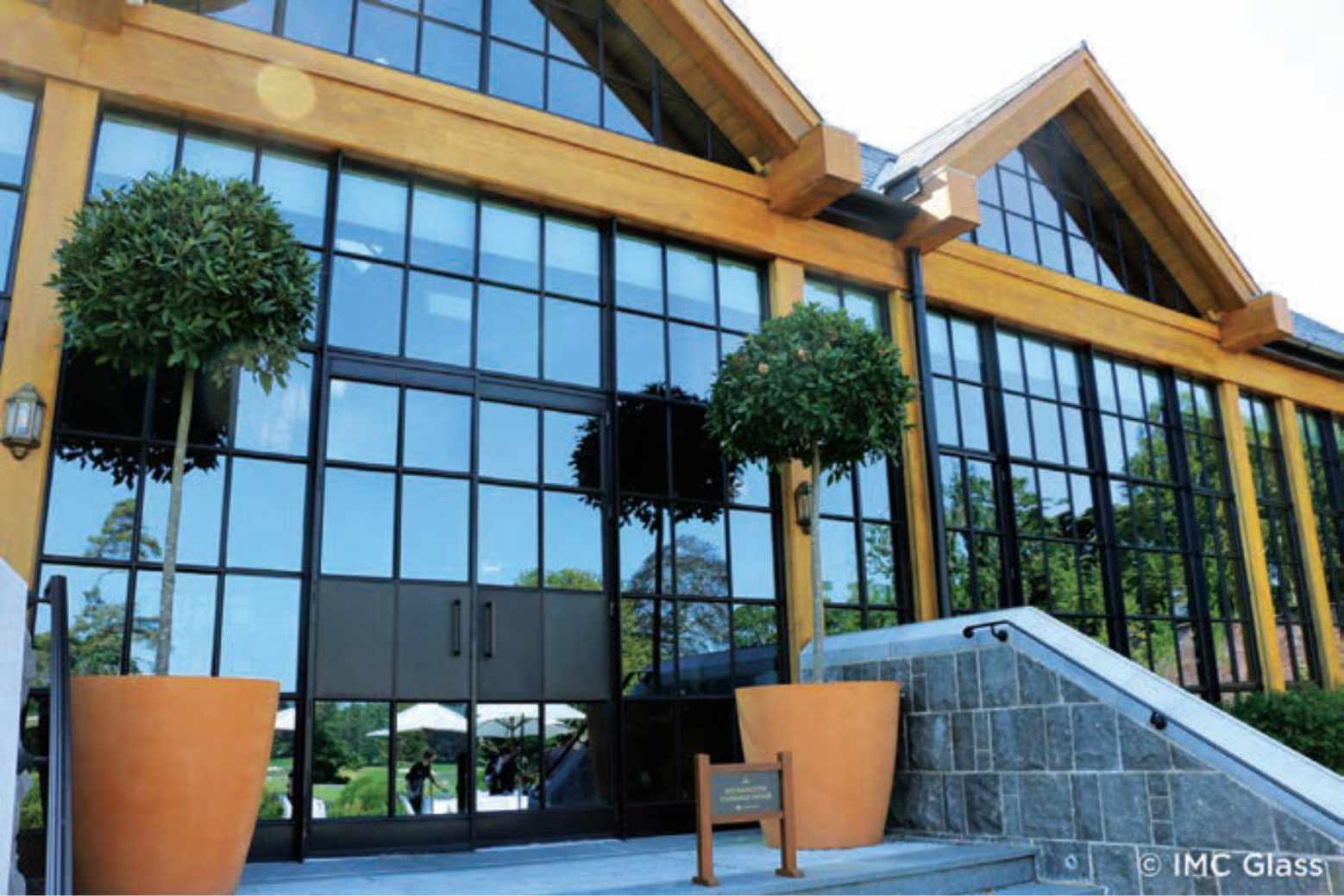
The fact that the banking buildings have already survived two fires is not visible. The last and most devastating one in 2018 destroyed the entire timber construction and practically the entire supporting structure. The steel stiffening beams, and the original cast-iron supporting pillars had either collapsed or been weakened. Only the non-load-bearing enclosing walls remained standing.
Historic buildings can be more than just a landmark or the legacy of an architectural era. Benedict McAteer, research fellow at the School of Natural and Built Environment at Queen’s University in Belfast, describes the feelings of Belfast residents after the disaster: “The fire has made us realise how we need buildings to explain what we have been through, what a city has endured and what it is that we enjoy about living there.”
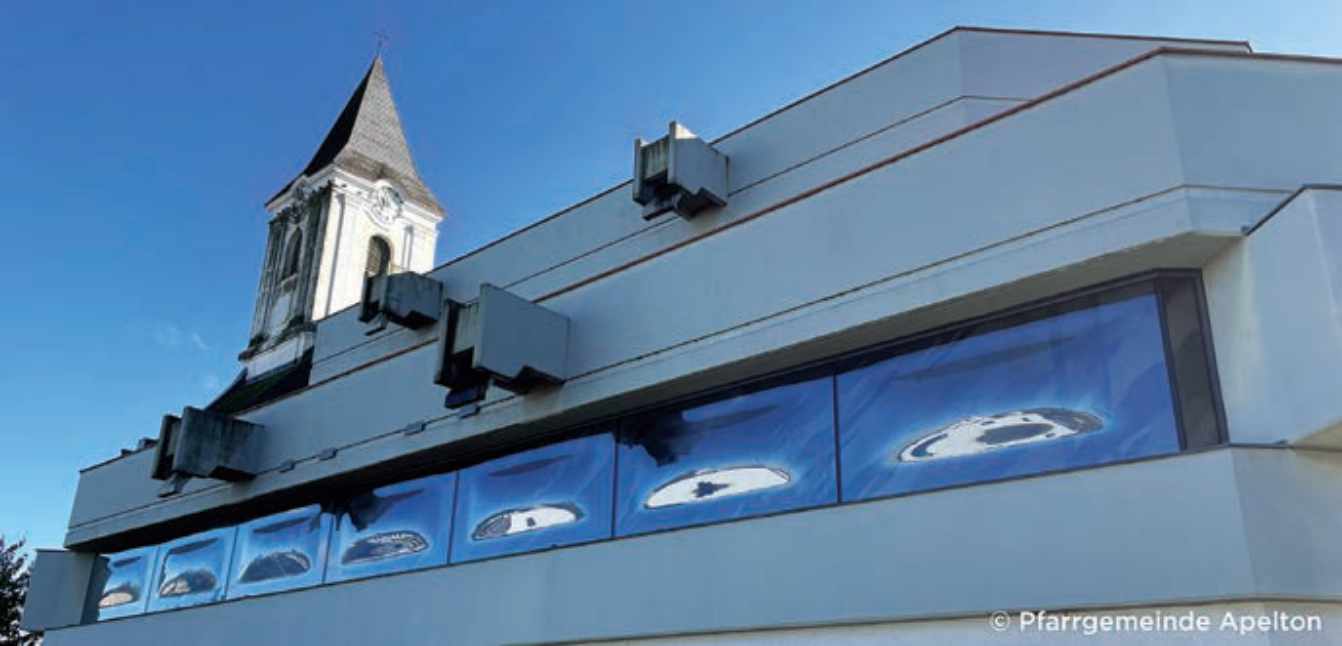
After the initial impulse to demolish the charred skeleton, an exemplary reconstruction based on the original model began. Each removed stone was numbered, and natural stone and marble for the new facade was sourced from the same quarries in Finland, Scotland and Portugal that had supplied the original materials in the 19th century.
IMC Glass supplied a total of 300 units from its Slim-Glaze range to replace the single-glazed windows from the 3rd floor upwards, which were also manufactured according to the historical model and installed in 1980. “This super-slim double glazing makes it possible to retain the original style with excellent thermal efficiency.
With a unit thickness of just 14 mm, they achieve an Ug value of 1.2 W/ m²K,” explains Managing Director Aaron McCreanor.
IMC’s specialist insulating glass products are characterised by a slim yet low edge seal and krypton gas filling. “IMC Glass is the only company in Ireland, and only one of two in the British Isles, to have been awarded a Kitemark for testing to BS EN 1279-2 and BS EN 1279-3 for moisture absorption and gas leakage rate,” McCreanor continues.
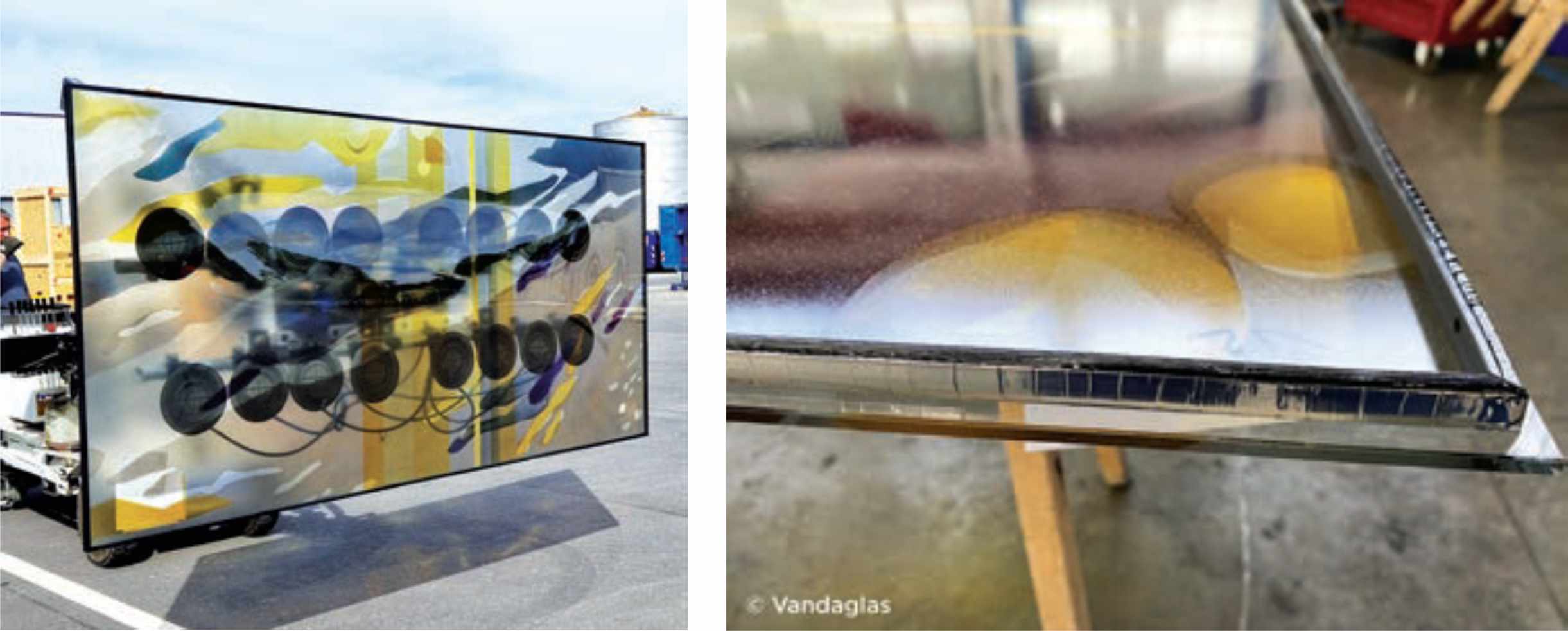
The icing on the cake is the Super Spacer® Heritage spacer, a flexible warm edge that was specially developed for double glazing in the restoration sector. With a height of just 3 mm, it can also be installed in frames with very low glass inserts without being visible.
Extra-thin double-pane insulating glass replaces single-pane glazing
A report jointly published by the Glass and Glazing Federation and British Glass in October 2023 shows that around 98 per cent of windows in the UK do not meet the current minimum Ug-value standard of 1.4 W/(m²K). Heat loss due to inefficient windows is up to three times higher than in countries such as Germany, Austria, or Sweden. “Our Slim-Glaze products with Super Spacer Heritage can be exchanged for single glazing in many cases. If the frames are no longer worth preserving, they can be authentically rebuilt.”
The luxury Adare Manor Hotel & Golf Resort in County Limerick, built in the mid-19th century in neo-Gothic style as a private family residence, has already taken this step. Wherever possible, the historic glass was reused, and all modern single-glazed windows were replaced with double glazing.
IMC Glass supplied a total of around 1,100 insulating glass units to three different window manufacturers for the renovation of the main house and Carriage House. “In addition to energy efficiency, the lower dew point was particularly important for the client. Condensation is not only a visual and health problem, but also attacks the wooden frames.”
Arched artist’s windows make the church extension shine
The heritage-listed Catholic parish church of St Margaret in the Burgenland municipality of Apetlon is a special feature. Completed in 1797, the church was always so well attended that it was extended in 1974/1975 with a modern, octagonal concrete extension in the Brutalist style designed by architect Josef Patzelt. The extension is cantilevered without pillars, the pews are arrangedaround a popular altar and the church’s patron saint, St Margaret, looks down on the faithful from the high altar dating from the end of the 18th century.
The two window bands with a total of 36 panes of 6 mm Plexiglas illuminate the interior with natural daylight. Having failed to withstand wind loads at times in the past, they were arched outwards. Coloured church windows had been planned from the outset, and in September 2023 the long-held wish of the Apetlon parish finally became reality.
With her abstract and yet narrative depiction of the life and martyrdom of St Margaret of Antioch, the Berlin artist Marie-Luise Dähne also solved the functional task of softening the strong sunlight while at the same time preserving the visual to nature outside.
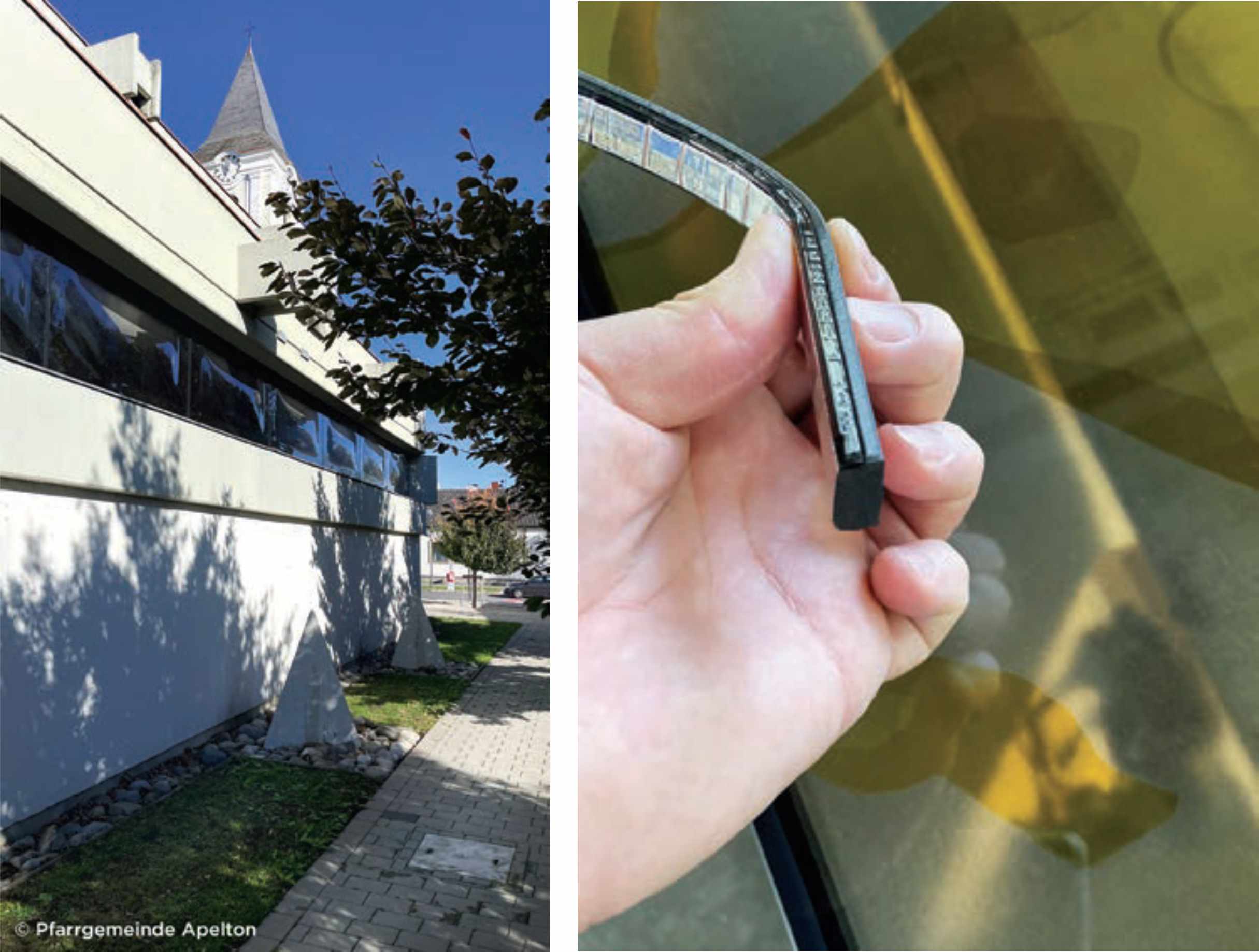
At the entrance to the church, the discs are dark and are reminiscent of Margaret’s godless childhood as the daughter of a pagan priest. Small golden beads, increasing in number as the window bands progress, symbolise her faith, which enables her to survive torture, the devil’s temptations and finally the execution, and on the other hand the growing Christian community.
In the renowned Paderborn atelier for glass painting, Peters transferred the design by hand using ceramic colours onto the 6 mm tempered safety glass panes in formats ranging from 1.6 x 1.3 m to 2.6 x 1.4 m and then melted the motifs at 600 degrees Celsius. “We have been working with Marie-Luise Dähne again and again for many years,” enthuses project manager Christoph Sander.
“She manages to merge her artwork with the architecture. In Apetlon, St Margaret is thus physically and spiritually transformed into a source of light.”
Flexible spacer avoids thermal bridges at the edge of the glass
Based on the old Plexiglas panes, the monument protection authorities made curved panes a requirement. The Vandaglas site – Vandaglas Döring Berlin was commissioned to manufacture the 3D moulded insulating glass units, CurvePerformDGU from CurvePerformMono “Freeform curved” outer pane 6 mm with a flat laminated safety glass as a decorative counter pane in the insulating glass units.
As part of the glass refurbishment, the windows were also to be modernised in terms of energy efficiency. The flexible Edgetech Super Spacer® TriSeal SG and Dow Corning 3362 were therefore used for the edge seal. Vandaglas Döring site manager Carsten Kunert commented about the project: “The convex cavities are moulded out of the flat pane. This looks unspectacular at first glance, but the geometry of multi-axis curved panes is complex and therefore makes it difficult to predict the material behaviour during bending and after installation. Based on our many years of experience, we have once again opted for the flexible Super Spacer spacers for the Apetlon insulating glass units. They are easy to apply, support resistance to wind loads and make a significant contribution to energy efficiency, as there are no thermal bridges at the edge of the glass.”
About Edgetech Europe GmbH
Edgetech Europe GmbH, located in Heinsberg, Germany, is a fully owned subsidiary of Quanex Building Products Corporation, a global, publicly traded manufacturing company primarily serving OEMs in the fenestration, cabinetry, solar, refrigeration and outdoor products markets. Edgetech Europe GmbH services markets in continental Europe with a total of 490 employees and 17 extruders.

Email: info@edgetech-europe.com
Website: www.superspacer.com









